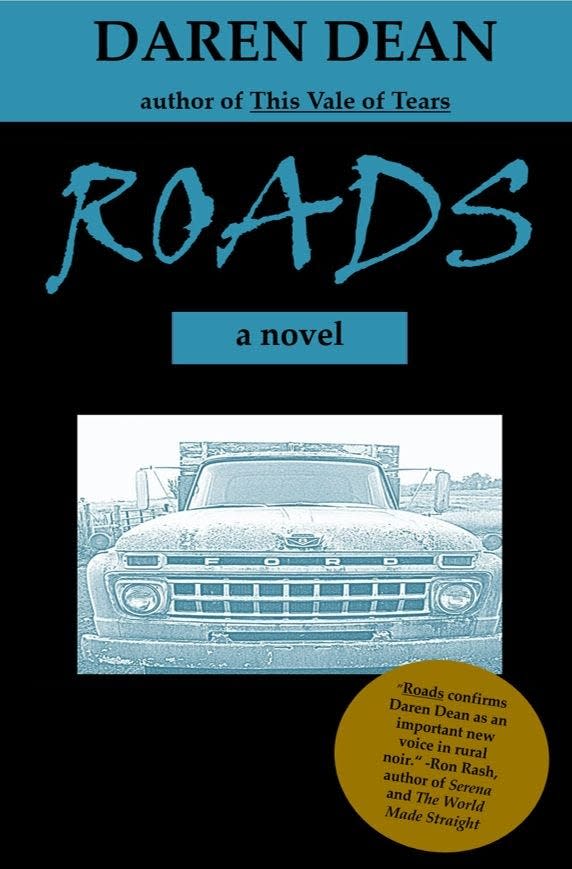Mid-Missouri novelist Daren Dean's latest travels 'Roads' to heaven and hell

Meeting a Daren Dean character customarily provokes one of two equally powerful but opposite reactions.
You fall in love right away, tumbling into a punch-drunk crush. Then, with silent horror behind your eyes, you watch that love corrode as the character ruins nearly everything within and without them with a reverse Midas touch.
Or you experience a sick allure, defying strict definitions of repulsion and attraction. You love to hate this character — and hate to start to loving them as they grow more complicated with each page.
Dannie Gail Posey, the teenage girl who forms the beating heart of "Roads," may be among the few figures to defy this ever-warping binary. She flaps her young wings constantly, trying to remain above the fray — but the people surrounding Dannie Gail do her few favors. Living among roughed-up, puffed-up men and long-suffering women, she labors to keep her inner goodness and bend it into something resembling a future.
"Everyone said she was too tender-hearted, but someone had to feel something around here. She even cried during some commercials. She thought she just might be more normal than the rest of them," Dean writes in his latest.
More: Columbia native Ellie Grace lands song on collection curated by Peter, Paul and Mary great
Dannie Gail's heart is tested when her older sister disappears, then comes home in a black-and-blue fugue. This moment, one in a history of a hundred unfortunate moments, draws the Posey clan further into its feud with the neighboring Lynches, the clash threatening to swallow both families whole.
Think "Romeo and Juliet" with all the romance replaced with leering men and persevering women, un-payable debts and violent, accruing interest. The way these tensions express themselves, and Dannie Gail's movement through the thick, makes "Roads" another worthy offering from the mid-Missouri author.
Where Dean's 'Roads' lead

Dean, who teaches at Lincoln University in Jefferson City and formerly lived in Columbia, opens "Roads" with an epigraph from Longfellow: "The roads shall mourn and be veiled in gloom."
These timeless words gesture toward the violent sighs of lament which sound throughout — and to the perpetual motion of these characters. They are either aimless or resolute, depending on your definitions, traveling backroads, dirt roads, main-street drags but never getting anywhere good.
Such motion works throughout Dean's growing canon, much of which has been written in a vein called "grit lit" — here, the tectonic plates of Southern Gothic and Midwestern cliffhangers collide and erupt. Dean's previous books include modern inventions such as "Far Beyond the Pale" and "This Vale of Tears" and the Civil War-era novel "The Black Harvest."
More: Civil War novel first step in a big year for mid-Missouri author Daren Dean
His work lines up alongside authors such as Larry Brown, Daniel Woodrell and S.A. Cosby. And while his prose bears a different style, Dean borrows a key element from Cormac McCarthy: their books are shot through with a common confession, that this world — and all the creatures in it — run wild. Whether that wildness proves brutal or beautiful depends on a person's ability to understand and harness its energy.
Dannie Gail's every effort — to really know what happened to her sister, to keep recent history from rhyming or repeating — is hampered by her family. The Posey men are impotent and brutish, always hunting something. "Some might say the coyotes and the Poseys were cousins or at least that’s what she thought," Dannie Gail thinks.
"Our men like to have their secrets. Makes them feel important. Delusions of grandeur," her cousin Lucinda says later in the book, laughing to keep from crying.
The women in Dannie Gail's life are more interesting, more dimensional, but equally confined. Her Aunt Esther practically brags about her slipping grasp of reality.
"For Aunt Esther, malaise said it all even if she wasn’t sure what it meant in plain English," Dean writes.
Lucinda is an ally, possessing inner strength but forever tossed about by her loyalties.
"She prayed Lucinda would know what to do," Dean writes. "But Lucinda seemed to be having a conversation with herself in her head. Every so often she shook her head as if answering a question from the authorities."
Looming large, above and around them all, is Dannie Gail's Uncle Smith, some strange cocktail of guardian, matinee star — looking out from "Beautiful eyes really. Eyes that held unspoken accusations and hangover dreams" — and some ancient territorial god whose story ends in tragedy.
Crafting a town we all know
Dean writes with almost documentary precision of the desires, dangers and beauty of small-town life — in Missouri or elsewhere. Dannie Gail and her unlovely loved ones are hemmed in by unholy local ghosts.
Those specters wander every one of Dean's "Roads," switching signs, painting over mile markers, keeping everyone guessing whether they're traveling to heaven or hell. They fill up the hearts and minds of his characters with religious language that can be either a salve or a curse, depending on the moment.
Dannie Gail's dreams sometimes turn "prophetic," Dean writes in an early passage; a dog wanders up "with the rheumy eye of a prophet" in one scene; a "Biblical fear" settles over each moment. And even the natural beauty of Dannie Gail's world comes into one, specific question: Is anything on Earth as it is in heaven?
"Out in the sunlight again she looked over the pond that partially reflected the blue of the sky and a glaring white light that hurt her eyes with its purity like it must be the light from heaven as she had imagined it since first hearing Sunday school stories about what it would be like to be in the presence of God," Dean writes.
More: May exhibits at Sager Reeves Gallery call viewers into small-town scenes, visual details
For all the screw-tightening of "Roads," Dean often pens passages of great, lyric beauty. He acknowledges the glories of the world while never closing an eye to its hardness.
"An enormous new moon back-lit by the vanishing blue sky hung above the inked hedge trees over the horizon. It was almost dark over Posey Hill as a dying sun hurtled beyond the horizon trailing an orange-red haze of strangled rage into twilight," he writes early.
Dannie Gail's instinct to leave everything and everyone in this town behind is both common to small-town characters, real or constructed, and more specifically drawn by Dean's hand. She clings to excuses and escapes in everyday life; changing up the "exotic disease" which killed her mother, imagining herself as "the female lead in every film."
She has real circumstances to run from, real ambitions to run toward:
"She dreamed of someday buying land in Montana and having a horse ranch out there like all the movie stars ... She wanted a herd of horses: some westerns, quarter horses, and maybe a few Arabian-mix ponies too. Another idea she had was taking her old Martin guitar to Nashville and playing around until she made it big."
Winning the tug-of-war
With all that pulls and pushes on Dannie Gail, she wants to stay herself. In a pivotal scene, she watches the faces of her mother and sister become her own in the mirror. Sensations of terror and disassociation come first, but she musters up a mystic's bravery, becoming most herself by mining strength from others.
"A new person stood before her," Dean writes. "... 'You're still Dannie Gail,' her inner interlocutor said from the mirror in a low tone of voice, 'only better.' "
These desires — to honor our families while avoiding their fates; to find, then transcend, ourselves — meet us on roads that do and don't resemble Dean's. They endear Dannie Gail to readers and give those on and off the page just enough grace to meet the next fork.
Aarik Danielsen is the features and culture editor for the Tribune. Contact him at adanielsen@columbiatribune.com or by calling 573-815-1731.
This article originally appeared on Columbia Daily Tribune: How Daren Dean's novel 'Roads' builds a mystery in small-town Missouri

